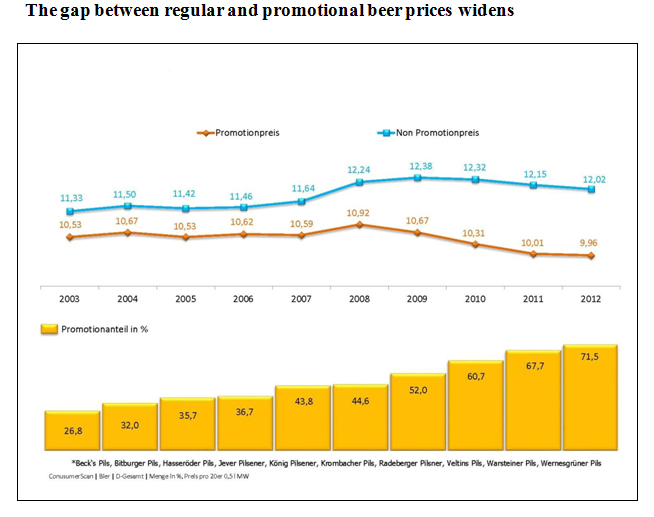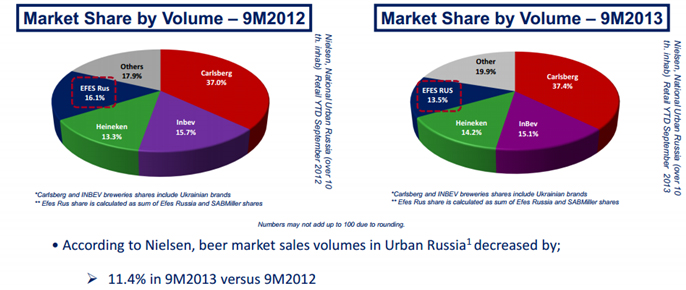Since they could not get the Cuervo tequila brand, they bought two others instead. In January 2014, Diageo, the world’s major drinks company, added two super-premium brands to its portfolio.
In January 2014, five German brewers were fined a total of EUR 106.5 million for collusion in 2006 and 2008. Several more are under investigation by the Federal Cartel Office. Strangely enough, Germans still enjoy what must be the lowest prices for beer in Europe. Given that retail prices have actually declined over the past decade, many wonder what the real purpose of the beer cartel was since it failed to achieve a cartel’s primary goal.
Given that AB-InBev in 2013 sold about 42 million hl of Budweiser, it sounds a bit preposterous that the Czech state-owned brewery Budejovicky Budvar, which has been fighting a long legal battle with Anheuser-Busch and now AB-InBev over the use of the “Budweiser” brand, boasted in early January 2014 that its overall output and exports reached a new high in 2013.
The Scottish brewery BrewDog managed to raise GBP 4.25 million (USD 6.9 million) in six months in a record-breaking crowd-funding scheme, the company announced on 23 December 2013. That was one month earlier than planned.
The Federal Cartel Office has fined five German brewers a total of EUR 106.5 million for illegal price fixing. The group of convicts include national brewers Bitburger, Krombacher, Veltins, Warsteiner and the regional brewer Barre.
Drinking alcohol is bad for you. Remember what happened to the notorious pissheads Peter O’Toole, Richard Burton, Richard Harris, Oliver Reed, George Best, Mary Winehouse and Kurt Cobain? All dead. And Charlie Sheen, Miley Cyrus, Pete Doherty cannot be feeling too well after their many close encounters with the bottle.
“Love beer” is the moniker of a generic beer campaign that is presently being tested in five European countries. If the campaign syncs with consumers, it could be rolled out across the European Union as of April 2014, provided national brewers’ associations are willing to cough up the money to run it in their own countries.
Hopefully, supporters of generic beer campaigns take the ruling by the UK’s advertising watchdog to heart. In December 2013 it ruled that a TV ad for brewing industry marketing campaign “Let There Be Beer” cannot be shown again in its current form.
How much worse can it get? The Russian beer market might decline at a rate of low-double digits in 2013, mainly due to the negative impact of the regulatory changes, pricing environment and the deceleration of economic growth, Turkish brewer Efes warned investors in late 2013.
Brewers have applied to UNESCO, the United Nations Organisation for Education, Science and Culture, to have their “Reinheitsgebot”, the German beer purity law, join a list of “intangible heritage” that includes Spanish flamenco and Turkey’s Kirkpinar oil-wrestling festival, media reported at the end of December 2013.


